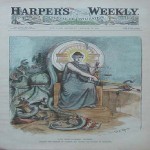What Are The Core Constitutional Values Behind The Tea Party Movement?
 I recently posted an article on SSRN entitled “Charters, Compacts and Tea Parties: The Decline and Resurrection of a Delegation View of the Constitution.” You can download the article here.
I recently posted an article on SSRN entitled “Charters, Compacts and Tea Parties: The Decline and Resurrection of a Delegation View of the Constitution.” You can download the article here.
The emergence of the Tea Party Movement as a political phenomenon has generated a great deal of media attention and punditry over the last year. Most observers have concluded that those who self-identify as “tea partiers” comprise a loose amalgamation of libertarians, states’ rights advocates and opponents of government intervention in the free markets. While most activists have a Republican voting record, the Movement appears to have arisen independent of the Republican Party. Critics of the Bush Administration’s domestic spying activities stand shoulder to shoulder with skeptics of the Obama Administration’s health care reform efforts. To the extent that Tea Party activists share one common political philosophy, that philosophy might best be described as “rage against the federal government.”
Liberals seem inclined to deny the existence of any intellectual content behind the Tea Party Movement, preferring to focus on the undeniable presence of some racists, militia members, and conspiracy theorists among the activists. While it is safe to assume that, for some, anger at the federal government seems inextricably connected to the fact that an African-American is President, Juan Williams is correct when he identifies the core concerns of the Movement as non-racial. Similarly, the “birthers” and other fringe elements in the Movement are merely piggy backing on a generalized anger against the federal government that does not derive from their parochial concerns. Our nation’s public discourse would benefit greatly if conservative intellectuals did more to repudiate these fringe elements, much the way that William F. Buckley famously repudiated the John Birch Society in 1965, but the “anger industry” that profits off of cable television, books and political fundraising appeals is apparently loathe to alienate any of its prime consumers.

 The Supreme Court decision in
The Supreme Court decision in 